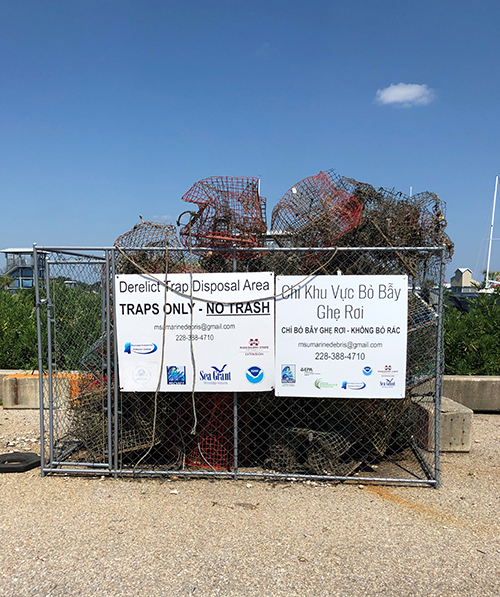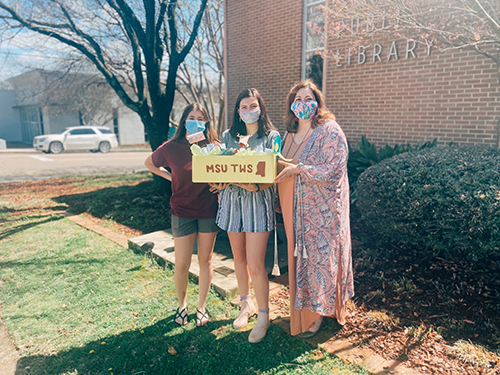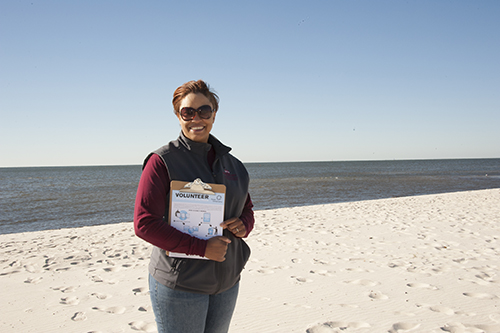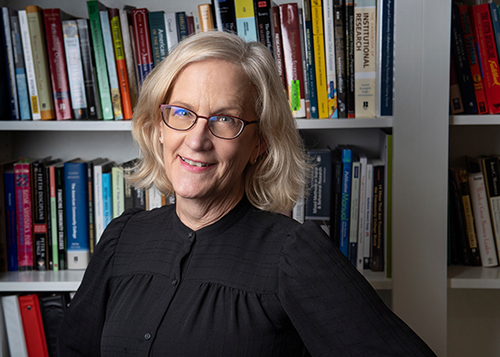MSU announces Excellence in Community Engagement Award recipients
Contact: Sasha Steinberg
STARKVILLE, Miss.—Mississippi State is recognizing eight outreach projects with the university’s fourth annual Community Engagement Awards.
Two awards—winner and honorable mention—are given in four categories. These include community-engaged research; community-engaged teaching and learning; community-engaged service; and scholarship of engagement.
Winning projects receive $3,000, and honorable mention projects receive $750 to further their activities. MSU’s Center for Community-Engaged Learning, Office of the Provost and Executive Vice President, Office of Research and Economic Development and the Division of Student Affairs selected the recipients.
Honorees include (by category):
COMMUNITY-ENGAGED RESEARCH

Winner—“Marine Debris Removal,” submitted by Alyssa Rodolfich, Extension program assistant with MSU Extension’s Coastal Marine Program in Biloxi. Extension professionals and leaders from Mississippi Commercial Fisheries United, in coordination with the U.S. Environmental Protection Agency, developed a derelict crab trap disposal incentive program and economic impact study on marine debris and its impacts on the commercial shrimping industry. The efforts of 44 participating fishermen have led to the removal of nearly 3,000 derelict crab traps from the north-central Gulf of Mexico since 2019. Learn more at http://coastal.msstate.edu/crab-traps.
Honorable Mention—“Santa Teresita Water Distribution,” submitted by Macey Wallace, co-project manager for MSU’s chapter of Engineers Without Borders–USA and a senior civil engineering major from Oneonta, Alabama. MSU’s EWB chapter is working to improve the water distribution system in the small Ecuadorian village of Santa Teresita. The primary goal is to restore the system’s structural integrity and improve its capacity by replacing much of the pipe network, upgrading tanks and expanding the system to include a third spring that delivers clean water for consumption, hygiene and agriculture needs. Santa Teresita community members have been heavily involved in planning and data collection since 2019, and they will work alongside MSU EWB members to implement the new system throughout 2022.
COMMUNITY-ENGAGED TEACHING AND LEARNING

Winner—“Engaging and Educating Youth about Conservation,” a project led by Kayla Feist, a conservation education master’s student from Meridian, and Abby Florez, a spring 2021 wildlife, fisheries and aquaculture bachelor’s graduate from Clover, South Carolina, with collaboration from Starkville Public Library Children’s Services Librarian Loraine Walker. Members of the MSU student chapter of The Wildlife Society and faculty advisors Leslie Burger and Chris Ayers also assisted with the project, which addressed the need for youth engagement during the COVID-19 pandemic in ways that did not require face-to-face interaction. MSU Wildlife Society members created “drive-by” and “pick-up” crafts to highlight wildlife science and conservation. The students also recorded wildlife-themed book reading videos that quickly reached an average of 1,000 views on the Starkville Public Library website and generated positive feedback from local parents.
Honorable Mention—“LivingRoom at Leland School Park,” submitted by Cory Gallo, MSU professor of landscape architecture. An MSU cross-college collaboration, the garden at Leland School Park was completed using an award-winning design concept called The Living Room: A Freeware Learning Garden Focused on Health, Food and Nutrition Education. MSU faculty and students in the College of Agriculture and Life Sciences’ landscape architecture department and the College of Architecture, Art and Design’s architecture and graphic design programs developed the model. Gallo, MSU Professor of Architecture Hans Herrmann and MSU Associate Professor of Graphic Design Suzanne Powney co-led the project, which challenged MSU students to improve upon the concept of learning gardens. Collaborators for the first deployment of the LivingRoom Garden streamlined for installation at Leland School Park include AIM for CHANGE (Advancing, Inspiring, Motivating for Community Health through Extension), an MSU Extension program that funded the project with support from the Centers for Disease Control and Prevention; and Delta EATS (Edible Agriculture Teaching Students), a nonprofit group that is part of the Delta Health Alliance.
COMMUNITY-ENGAGED SERVICE

Winner—“Mississippi Coastal Cleanup Program,” a nonprofit educational program led by Eric Sparks, director of MSU Extension’s Coastal Marine Program, and coordinated by Extension Program Associate Mandy Sartain, both with the MSU Coastal Research and Extension Center in Biloxi. The MSCCP promotes conservation of the local marine environment through the organization and implementation of cleanup events and educational programs in coastal communities year-round. Large-scale events including the Annual Mississippi Coastal Cleanup, Star-Spangled Cleanup and Monthly Beach Cleanups engage thousands of volunteers in efforts to reduce marine debris and litter in waterways and along beaches. By integrating the latest research, the MSCCP trains community leaders and fellow stewards on ways to incorporate litter management practices into their ongoing programs. Through sponsorships and partnerships with local organizations on a variety of projects, the MSCCP seeks to empower all community members—youth to adult—to make sound decisions that protect the environment.
Honorable Mention—“arcM Rabbitry in Guatemala,” submitted by Derris Devost-Burnett, associate professor in MSU’s Department of Animal and Dairy Sciences. The “Guatemala Livestock Education” program, MSU’s first international community-engaged learning course, has been a tremendous success leading to additional activities on campus and abroad. In the last three years, the program has taken 57 students abroad and has engaged community members in training for animal health, husbandry and productivity. The project goal was for families to use rabbits for consumption and as an income source to improve their socioeconomic trajectory. Since the project’s inception, these families have gone from consuming high-quality animal protein in 1.2 meals per week to over 4 meals per week, according to the most recent follow-up survey. These results speak to the program’s impact in equipping MSU students and the program’s community network to empower a determined yet underserved community in the highlands of Guatemala.
SCHOLARSHIP OF ENGAGEMENT

Winner—“Mississippi Delta College Access,” submitted by Carol Cutler White, assistant professor in MSU’s Department of Educational Leadership. With funding from the Corporation for National and Community Service, Cutler White has engaged in participatory action research with the city of Greenville to build an outreach and service model to reach marginalized populations in the Mississippi Delta where less than 25% of the population has a bachelor’s degree. Three community members/co-researchers assisted Cutler White and Greenville Mayor Errick Simmons with formation of the Greenville College Access Network to support college-bound students and their families in navigating the college application process, especially paperwork for financial aid. Cutler White presented a GCAN Action Plan to the Greenville City Council, which adopted the plan through a resolution of support in January 2021. Co-researchers recruited community volunteers, and the Woodward Hines Education Foundation program trained them in financial aid application completion. Cutler White assisted Simmons’ office with an AmeriCorps planning grant application to the Mississippi Volunteer Commission, administrator of AmeriCorps funding in Mississippi. The commission awarded the planning grant in August 2021, and work is underway to build a sustainable model of AmeriCorps volunteer support for the GCAN initiative to provide ACT test prep, career counseling, and assistance with college and financial aid applications. Cutler White’s research is now focused on the role of trust in the college access process.
Honorable Mention—“The Art Yard,” submitted by Leah Kemp, director of MSU’s Fred Carl Jr. Small Town Center. The CSTC partnered with Henderson Ward Stewart Elementary School in Starkville to design and implement an outdoor learning environment called “The Art Yard,” which incorporates art and creative learning opportunities for elementary-aged school children. Developed as a response to COVID-19, the outdoor classroom provides a healthier, alternative learning environment during the current pandemic and enhances opportunities for creative learning in the future. The CSTC collaborated with community, campus and other partners to execute the outdoor classroom using small grants within an eight-month time frame. MSU’s IDEA Shop assisted with the design and fabrication of colorful outdoor seating modules that could be used in the classroom, and school district administrators, staff, teachers and students helped develop ideas for incorporating art into the learning process and site design. The CSTC also created a free digital toolkit, so classrooms can be replicated elsewhere.
For more information on MSU’s Community Engagement Awards or the Center for Community-Engaged Learning, visit www.ccel.msstate.edu.
MSU is Mississippi’s leading university, available online at www.msstate.edu.